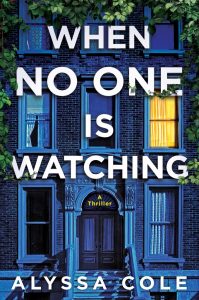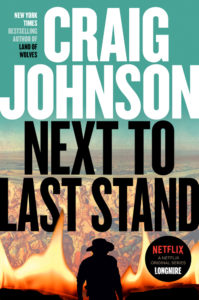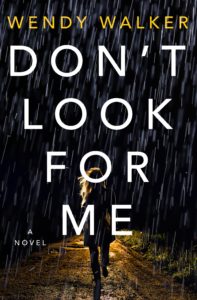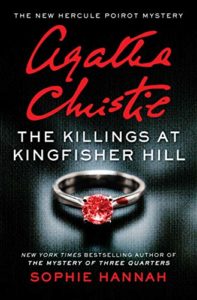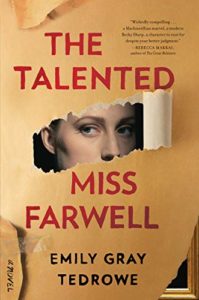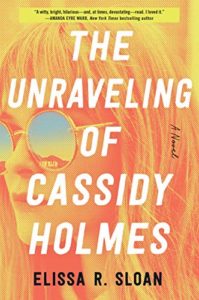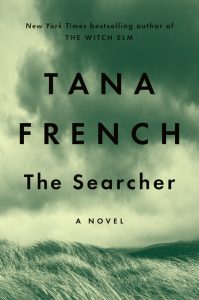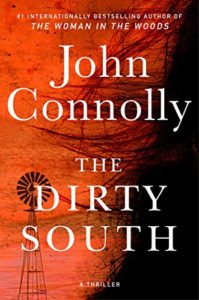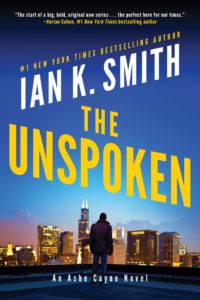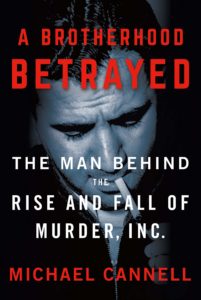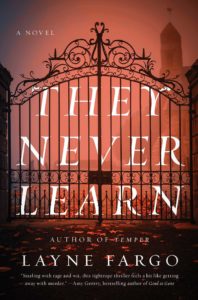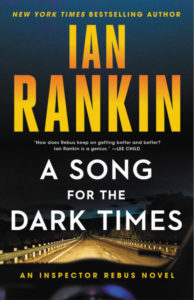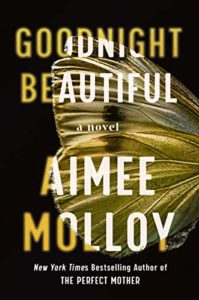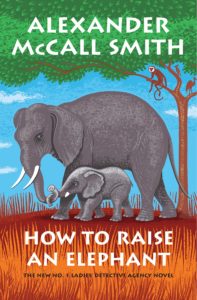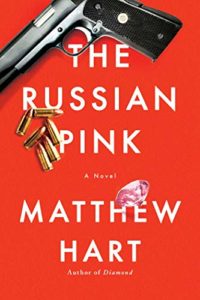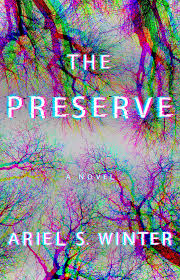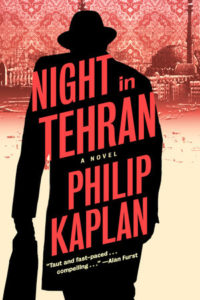While many us might feel like March has never ended, the fall/winter season of our discontent is fast approaching. And while most of us now wear sweatpants year-round, the book world is here to provide us with structure to our days, and of course, something to look forward to. Perhaps because of so many publication delays, the fall season brings a cornucopia of quality genre fiction. In this most contemplative of seasons, readers can enjoy a wide array of espionage, noir, traditionals, psychologicals, historicals, and crossovers, with plenty of new voices and old favorites. Whether you’re looking to learn, escape, think, or process, Fall 2020 has a book for you! We encourage everyone to double check the publication dates on Bookshop.org as many publication dates continue to shift (Find more the year’s most anticipated books, here and here.)
___________________________________
September
___________________________________
Alyssa Cole, When No One is Watching (William Morrow)
Alyssa Cole’s When No One is Watching isn’t just a great thriller—it also got me out of my initial month-long Covid reading funk. Cole’s gritty narrator is already struggling to deal with creditors, her mother’s illness, and the fallout of a bad relationship, but the rapid gentrification of her Harlem neighborhood is making everything worse. The real estate agents are increasingly pushy, the new white neighbors will do anything in the name of their own security, and longtime residents of the neighborhood are vanishing overnight at an alarming rate. As the protagonist finds out (in glorious, pulpy fashion) there’s a lot more going on to the changes in the neighborhood than just a few housing sales. –Molly Odintz, CrimeReads Senior Editor
Martin Edwards, Mortmain Hall (Poisoned Pen Press)
Martin Edwards has long been a champion of the Golden Age of detective fiction, serving as series editor for the British Library Crime Classics series and spreading the gospel of fair play and clever plotting. His own novels pay homage to the beloved traditions of the genre, while spinning fresh versions of classic tropes. In Mortmain Hall, Edwards’ follow-up to his debut Gallows Court, a dying man begins to explain a perfect crime, but expires before he can finish. Meanwhile, a detective races to prevent a murder when no one around him takes the threat seriously. Edwards does justice both to his inspirations and to his 1930s setting—a perfect traditional mystery. –MO
Rachel Howzell Hall, And Now She’s Gone (Forge)
Rachel Howzell Hall introduces a new PI heroine up against a formidable first case in her latest. Grayson Sykes is hired to track down a missing dog, kidnapped by the owner’s former girlfriend, Isabel Lincoln. The longer Sykes is on the trail of her elusive subject, the less she understands her—until she suddenly understands her all too well. Meanwhile, Sykes gets to overcome some of her own personal challenges in ways that should lead easily into more volumes in the series. –MO
Ruth Ware, One by One (Gallery/Scout)
Ware has quickly earned herself a place atop the psychological thriller world in recent years, and One by One, which brings in elements of the traditional mystery, is an exciting new addition to her body of work. A London-based tech company organizes a corporate retreat in the French Alps, complete with team-building exercises and all the powerpoint presentations a person can stand. The surroundings are luxurious, but a storm and an avalanche ratchet up the tensions, as does the possibility of a company buyout. When one of the co-workers goes missing on the mountain, the stakes are raised that much more, as colleagues and uneasy friends begin to turn on one another. Read this one now and it’s a safe bet there’ll be a very attractive adaptation for you to watch in the near future. –Dwyer Murphy, CrimeReads Editor-in-Chief
TRUE CRIME SPOTLIGHT
Debora Harding, Dancing With the Octopus (Bloomsbury)
Debora Harding takes a darkly humorous and matter-of-fact approach in her new memoir of abuse and generational trauma, anchored by a childhood incident in which the 14-year-old Harding was kidnapped and assaulted by a 17-year-old stranger. Harding draws a complex web of interlinked experiences to show how suffering can set up shop for good in a family and a town. Dancing With the Octopus joins a host of recent true crime memoirs dedicated to grounding crimes in a wider framework of social and familial contexts.–MO
Elizabeth Hand, The Book of Lamps and Banners (Mulholland)
After Curious Toys, last year’s delightful foray into dark carnival fiction, Elizabeth Hand returns to her nihilist punk rock narrator, Cass Neary, who’s on the hunt for a mysterious ancient manuscript that may hold the code to rewiring people’s brains—for good or for evil. As cool and topical as the rest of the series, this one features game designers, Swedish black metal enthusiasts, evil neo-nazis, strange rare book dealers, and a timeline that’s a count-down to this year’s pandemic, ending two days before the US lockdown was declared. While fans of the series will of course enjoy The Book of Lamps and Banners, it’s completely accessible to those with no previous experience with the series (such as myself, I’m rather embarrassed to admit, although I’ll soon rectify the error and read through the rest of this series). Also, if you’re wondering what to do in quarantine on a Saturday night that will still make you feel really cool, try reading any of Elizabeth Hand’s cult favorites. –MO
Craig Johnson, Next to Last Stand (Viking)
Leave it to Craig Johnson to unite the fictional traditions of the art heist thriller and the western in the latest installment of his Longmire series. In Next to Last Stand, Walt is called into the Wyoming Home for Soldiers & Sailors to assist in a case that links together a shoebox full of money, a dead veteran, and Custer’s Last Stand, a famed painting supposedly lost in 1946, and since turned into a cottage industry of reproductions with a major beer company at the helm. Following Walt through a world of paintings and western rogues is a disorienting, highly enjoyable odyssey, and readers are lucky Johnson is willing to take some risks and keep his wildly popular series innovative and fresh. Devoted Longmire fans and new readers alike will relish this one. –DM
Wendy Walker, Don’t Look For Me (St. Martin’s)
Wendy Walker plays with the trope of the mother who walks away in her latest psychological thriller. A mother grieving for her lost daughter disappears along a rain-soaked highway. Her family searches high and low but harbor doubts she left of her own volition. Meanwhile, the lost woman finds herself held captive by a woodsman who commands her to care for his feral child. She needs to get back to her family—before she meets the same fate as the child’s previous mother.–MO
Louise Penny, All The Devils Are Here (Minotaur)
The Gamaches have decamped to Paris on holiday in Penny’s latest, but of course, they won’t get to enjoy their vacation for long; Armand’s billionaire godfather is attacked in what is no random act of violence, and the Inspector must dig deep into the secrets of the past in order to protect his loved ones from any further harm.–MO
Ann Cleeves, The Darkest Evening (Minotaur)
DCI Vera Stanhope returns for a classic country house mystery. Vera is lost in a snowstorm when she comes upon a stopped car with a toddler in the back seat. She takes the child to the nearest town, and finds herself close to the estate she once grew up in. Seeking shelter there, she finds a corpse instead. She must unravel the case and care for the toddler as the blizzard rages around her.–MO
Sophie Hannah, The Killings at Kingfisher Hill (William Morrow)
Among the many posthumously-continued mystery series, is any in better hands than Sophie Hannah’s? The poet and crime scribe has managed to keep the spirit of Agatha Christie’s Poirot novels alive while always introducing new touches and flourishes to keep readers guessing and delighted. In her latest, Poirot is summoned to the proverbial country estate, traveling by luxury train where a fellow passenger’s mysterious fears of being murdered, later confirmed, may have a link to the case Poirot has been asked to address: the possible vindication of a woman soon to be hanged for murder. Insidious motivations and secret pasts converge in high Christie fashion, as the puzzle plays out in highly satisfying fashion. –DM
Smith Henderson and Jon Marc Smith, Make Them Cry (Ecco)
Henderson’s first novel, Fourth of July Creek, was one of the most powerful debuts in recent memory. His follow-up, co-authored with Jon Marc Smith, is sure to have thriller readers feeling very encouraged, as he turns to a high-octane world of drug violence, dangerous borders, and government conspiracies. Make Them Cry is reminiscent of the best 1970s thrillers, but its secrets are of the moment, as a former prosecutor turned DEA agent gets wind of a cartel secret and heads to Mexico City to investigate. This is chiseled, adrenaline-fueled thriller writing at the highest level. –DM
Emily Gray Tedrowe, The Talented Miss Farwell (William Morrow)
Becky Farwell has always been good with numbers—but it isn’t until she develops an obsession with collecting art that she begins shuffling them around to take from the town she works for and give to herself. She keeps promising herself that she just needs to amass a collection worth enough and then she’ll sell and get the town out of the hole, but instead she just keeps screwing her town over more and more. It’s sharp, darkly comedic, and full of fascinating facts about the art world.–MO
Micah Nemerever, These Violent Delights (Harper)
These Violent Delights takes us into the twisted relationship by two college students, in what feels to me like Rope if it was set in the late 1960s and was influenced by nihilistic disappointment in the horrors of the mid-20th century rather than Nietzschean thrills. When two teenage boys, Paul and Julian, meet in an ethics class, they are drawn together immediately, sharing a passion for justice (and soon for each other).
The book’s narrator, Paul, is the artistic working class son of a Holocaust survivor father who kills himself before the novel begins; he’s raw, angry, self-loathing, and full of the potential for violence, and he thinks of Julian as a god whom he’ll never be worthy of, and can never quite fully believe. He hunts butterflies for his collection, because it’s the only way he can keep a thing of such beauty for himself. Only Julian sees him for exactly who he is, but lucky for Paul, Julian much prefers who he is on the inside to the shy, unassuming boy Paul presents to the rest of the world. Julian is the son of a man so dedicated to assimilation that he registers the family as Episcopalian and taunts a visiting Paul by sprinkling every dish with bacon. His French shiksa wife is equally as status hungry, and just as needlessly cool.
They would each do anything for the other—except stop trying to gain the upper hand. Each endures slight after slight from the uncaring world around them, until they can endure no more. Brilliant, multi-layered, and with the most fascinating interplay of deed, morality, and symbolism I’ve come across since Watchmen. –MO
Elissa R. Sloan, The Unravelling of Cassidy Holmes (William Morrow)
As a forever fan of the Spice Girls, I devoured this take on early aughts fame, set during the height of the girl group craze. When Cassidy Holmes gets to the finals of a televised singing competition, only to lose as runner-up, she’s devastated, but an offer to become the fourth member of a girl group soon reverses her fortune. The four members of Gloss are talented, intelligent, beautiful—and completely out of their element. Their managers dress them in skintight bodysuits, the media christens each with a nickname guaranteed to evoke lewd and racist imagery (a la Spice Girls), and professional boundaries are violated in large and small ways as the so-called price of fame. A decade and a half later, Cassidy Holmes is dead, and the other members of Gloss are determined to find out what killed her.–MO
___________________________________
October
___________________________________
Romy Hausman, Dear Child (Flatiron)
This one’s a bit like Room, if Room had been set after the main characters escaped. It’s loosely based on a real life case of a man who kept his “family” captive indoors for so long that the children had severe health problems from lack of sunlight, small quarters, and lack of access to medicine. The twist is that the family that’s been rescued—a woman and two children —isn’t the original family that was held captive; there’s a previous mother out there and we don’t know if she escaped her captivity or was murdered. We also don’t know what will happen between the rescued replacement mother and the two children that have grown dangerously attached to her.–MO
Lisa Jewell, Invisible Girl (Atria)
Invisible Girl is a domestic thriller on the surface—a teenage girl goes missing in a quiet suburban neighborhood of London, and a woman suspects her husband, a psychiatrist who had the girl as a patient, to know more than he’s letting on; across the street from the troubled couple lives a young man who’s slowly getting involved with the online incel community, and soon becomes a suspect in the girl’s disappearance. The couple’s teenage son has also been up to some strange activities, and I won’t spoil it but the novel turns from a damsel in distress story to an excellent tale of feminist revenge in the face of growing misogyny.–MO
Max Seeck, The Witch Hunter (Berkley)
The Nordic folk horror trend continues with this clever metafiction occult novel. An author’s wife has been found murdered. She appears to have been killed in the same way as the author’s fictional victims. But what seems like a simple copycat killer turns out to be a large scale cult, and they have lots more plans…–MO
Tana French, The Searcher (Viking)
When a divorced cop buys a house in Ireland, he wants to relax, enjoy the countryside, and forget all about his former life. He sets to renovating his new home, and fills the rest of his hours down at the pub fending off attempts by the locals to set him up with a new partner. All that quickly changes when a young boy approaches him for help—the boy’s brother has gone missing, the police refuse to investigate, and the community’s already written him off as a rolling stone. The cop doesn’t like the odds, but he soon realizes that he misses the challenge. The Searcher isn’t nearly as dark as The Witch Elm, but has plenty of French’s trademark character studies and careful reveals. Fans and newcomers will be equally pleased!–MO
John Connolly, The Dirty South (Atria)
Every long-running series deserves a good origin story, and in The Dirty South, we finally get to dive into the dark first days of the man who would later become grizzled private eye and occult specialist Charlie Parker. Connolly’s series has ranged across the US, and in The Dirty South, we find Connolly weaving together Southern Gothic with Irish Noir for another great supernatural thriller.–MO
Brian Selfon, The Nightworkers (MCD)
In Brian Selfon’s emotional noir debut The Nightworkers, Shecky Keeney has convinced himself that his money laundering business is for his family’s own good. He can keep his nephew busy with the family trade and support his recently paroled niece as she struggles to adjust to the outside world. He doesn’t like to think about where the money comes from—he’s a professional, and his clients’ business is their own. But when one of his runners disappears, along with a quarter million in dirty money, Shecky’s carefully constructed world quickly begins to crumble. Accounts are frozen, cops are spotted keeping watch, and the barrier between what Shecky does and what his clients do becomes ever more tenuous, culminating in a shattering conclusion. Also, this book takes place right in my neighborhood, and it was really fun to read about a gangster going to my local farmer’s market and doing nefarious deeds in Maria Hernandez Park. Sadly, I’ve never woken up in time to meet the fish lady…–MO
Ian K. Smith, The Unspoken (Thomas & Mercer)
In Dr. Ian K. Smith’s third mystery novel, we’re introduced to a new cop-turned-private eye hanging out in Chicago, where he lives well off a settlement from the city while solving mysteries on the side. In The Unspoken, Smith’s new series character is hired by a wealthy woman to get her errant daughter away from her South Side boyfriend, who just so happens to have the most dangerous gangster in town as his uncle. Smith creates a fond and layered portrait of the Windy City, in all its multidimensional glory, as we traipse from fancy high-rises, to grungy boxing gyms, to tastefully decorated criminal lairs. Here’s hoping for many more installments in the series!–MO
TRUE CRIME SPOTLIGHT
Michael Cannell, A Brotherhood Betrayed: The Man Behind the Rise and Fall of Murder, Inc. (Minotaur)
When crime got organized, murder got incorporated. Michael Cannell, in his new history of the notorious Murder, Inc. gang of hitmen, has crafted a rollicking tale of mayhem and murder, arrests and atonement, in the best new true crime book about the mafia to come out in quite some time. Murder, Inc. had a simple pitch that led to an enormous body count: mafia leaders who wanted an enemy offed could approach the gang of murderers for hire, then acquire an airtight and very public alibi while Murder, Inc. took care of their little problem—at least until their leader started singing like a canary.–MO
Sherry Thomas, Murder on Cold Street (Berkley)
Sherry Thomas’s charming series featuring Lady Charlotte Holmes, who operates a detective agency under the alias Sherlock, is an utter delight, and the latest promises to be no exception. Holmes faces a difficult and personal assignment when she sets out to find out why her dear friend Inspector Treadles has been found in a locked room with two of his wife’s colleagues, both dead. She also faces a romantic conundrum in the form of an unexpected question from her on-and-off love interest, Lord Ingram. And of course she eats plenty of little tea cakes while deciding what course of action to pursue.–MO
Layne Fargo, They Never Learn (Gallery/Scout)
Layne Fargo’s delightful second novel is one of a few books that have been reinventing the vigilante genre for left-wing politics. In They Never Learn, a college professor spends her spare time carefully plotting the murders of misbehaving men; she picks one target a year—rapists, abusers, and the like—and then carefully dispenses her own brand of justice. When her university cottons on to a growing trend of suicides, including several of the professor’s victims, she needs to get creative fast in order to hide her tracks and keep her plans in motion.–MO
John Grisham, A Time for Mercy (Doubleday)
Jake Briggance has a solid claim to being one of the most iconic lawyers in modern crime fiction, thanks to his role in Grisham’s seminal thriller, A Time to Kill. Now Grisham brings him back for a new case, this time defending a teenage boy accused of murdering a police deputy. Grisham’s stories are always deeply felt and vividly drawn, and A Time for Mercy is no exception, with many striking portraits of the folks swirling around the trial in small town Mississippi, circa 1990. You won’t read a more meticulous, powerful legal thriller this year.–DM
John Banville, Snow (Hanover Square)
Banville’s latest is set in 1957 Ireland, where dark secrets are brought to the fore when a priest is found murdered in an aristocratic family’s home. The Booker Prize winner isn’t so much concerned with crafting a clever murder mystery, but rather, using a suspicious death as the jumping off point to examine the complexities and hypocrisies of mid-century life under the conservative de Valera regime. As astute and lyrical as any of Banville’s works, Snow continues to cement the legacy of one of our greatest living writers.–MO
Megan Rosenbloom, Dark Archives: A Librarian’s Investigation Into the Science and History of Books Bound in Human Skin (FSG)
Megan Rosenbloom’s foray into the world of books bound in human skin was one of the most surprisingly humanist and moving works of nonfiction I have ever come across. Rosenbloom is a medical ethicist librarian long affiliated with the death positivity movement, which I had never heard of until I came across this text and now desperately want to be a part of, and she leads workshops all over the country for the Order of the Good Death. Her interest in books bound in human skin was rewarded a few years ago when Harvard labs came up with a new method of scientifically determining if the binding of a book was in fact made of human skin. Megan Rosenbloom then went on an odyssey around the world to once and for all confirm the origins of those books rumored to have a binding of human origin. Results were surprising—most of the confirmed bindings were medical texts, bound by doctors in the 19th century, at a strange moment in time when artisan tanneries still operated but medical professionals had begun to be consumed by the medical distancing that allows one to bind a book in a dead patient’s skin, and still threatens the medical world today. The biggest surprise for me? That a book could include the words “What a beautiful flayed penis!” and end up as a gorgeous piece of writing on ethics and consent (with, of course, a visit to a modern tannery). –MO
Val McDermid, Still Life (Atlantic)
DCI Karen Pririe returns for a complex new investigation involving art forgery and cold cases in McDermid’s sixth work to feature Edinburgh’s Historic Crimes Unit. When a fisherman finds a dead body connected to one of Pririe’s old cases, she finds herself enmeshed in a complex case and coordinating with the departments of several nations. McDermid’s grasp of character and nuance is showcased in Still Life, along with her ability to keep readers guessing until the last page.–MO
Ian Rankin, A Song for the Dark Times (Little, Brown)
In any long-running series, things are bound to eventually get personal, and in Ian Rankin’s latest Rebus novel, the aging detective’s daughter is the one calling on him for help. Her husband has gone missing, and now the inspector finally has a chance to make up for his past parenting mistakes. The investigation has him contemplating the meaning of fatherhood, detection, and the nature of truth, for an emotional continuation of one of the world’s most respected series.–MO
Aimee Molloy, Goodnight Beautiful (Harper)
Aimee Molloy’s Goodnight Beautiful promises to be a delightfully wicked read with a clever set-up: a pair of newlyweds heads to a sleepy upstate town to start their new lives. While the husband holds therapy sessions downstairs, his new wife listens in, able to overhear every detail through a quirk of the air vents. Things start to get interesting when a French woman arrives in style and throws the whole house into chaos.–MO
Lee Child and Andrew Child, The Sentinel (Delacorte)
Come on, you know you’re curious, one of the most iconic crime fiction series of all-time is now a collaboration between brothers. Is Reacher going to evolve in some peculiar way? Are the fights going to be more visceral? Or less? The people need to know. The start to the new Jack Reacher book, co-authored by brothers Lee and Andrew Child, will put readers’ minds at ease, as Jack rides the proverbial Greyhound into a new town just outside Nashville and quickly spots an unwitting man walking toward an ambush. Ever the little guy’s champion, Reacher gets involved. That’s an understatement, isn’t it? Reacher always does more than “getting involved.”–DM
___________________________________
November
___________________________________
A lawyer who represents himself has a fool for a client, the saying goes, but who’s going to call Mickey Haller a fool? Haller is the creation of legendary crime author, Michael Connelly, and has his own wildly popular series under his better known moniker, The Lincoln Lawyer. In the latest installment, Mickey is pulled over with a dead client in his trunk, which lands him a hefty bail number and a stint in Twin Towers Correctional Center. He decides to represent himself and prove he was framed, which means his team on the outside is going to have to do the digging for him. The result is a tightly crafted thriller, with some nice crossover flair to boot (fans of Harry Bosch always enjoy seeing him show up in new places).–DM
Alexander McCall Smith, How to Raise an Elephant (Pantheon)
The 21st in Alexander McCall Smith’s beloved No 1 Ladies’ Detective Agency promises to be just as charming as the rest of the series, although the latest should hold special interest for fans of pachyderms. Things are slow at the agency—slow enough for Mma Ramotse to get a little too involved in her neighbors’ tumultuous romance, help a distant cousin with a tricky problem, and get to the bottom of a colleague’s malaise.–MO
Susan Yang, White Ivy (Simon & Schuster)
Ivy grows up with a harsh family that stifles her imagination. The sole exception is her hard-scrabble grandmother, who teaches her to lie and steal to get what she wants. After a humiliating run at a rich private school, Ivy heads to China to visit a relative who soon transforms the young teenager into one who imitates with ease the sophisticated elite. When Ivy reconnects with a classmate years later, she’s finally ready to use her new knowledge and old skills to take what she wants—and what she deserves. –MO
Halley Sutton, The Lady Upstairs (Putnam)
In Halley Sutton’s scintillating debut, Jo works for an agency dedicated to the artful blackmail of Hollywood’s grossest men. She herself owes a big debt to the Lady Upstairs, who once covered for Jo after a little trouble with Jo’s former boss and his newly wrecked office. But now Jo’s starting to figure out that she might never be able to stop working for the Lady, unless she takes matters into her own hands. And working together with a fellow employee may be the push Jo needs to finally give in to long-held feelings…–MO
Liz Nugent, Little Cruelties (Gallery/Scout)
Liz Nugent’s books exist at that very particular crossroads of horror and psychological thriller where the horror exists in the cruelty of human relationships themselves. In Little Cruelties, her latest, Nugent takes us into the twisted dynamics of three brothers long torn apart by their mother’s favoritism. All of the brothers do terrible things of one sort or another, but it quickly becomes clear that one, in particular, has been the target of unimaginable cruelty. As with all of Liz Nugent’s works, the sociopathy of characters is as much rooted in the repressed culture of 1980s Ireland as in the figures themselves. No one is rotten to begin with, Nugent knows, but she won’t let us look away from how truly rotten some of us become.–MO
Anthony Horowitz, Moonflower Murders (HarperCollins)
With Moonflower Murders, Horowitz delivers another masterpiece of metafiction, fresh off the heels of Magpie Murders. Retired-publisher-turned-hotelier Susan Ryeland grows weary of the paradisiacal Greek island she now calls home, so she’s bursting with curiosity when a family staying at the hotel shares a disturbing tale about a long-ago crime—one she recognizes as the inspiration for a best-selling mystery novel she once published. When the family’s daughter goes missing soon after reading the book, it’s up to Susan to track the errant teenager down and find out who really killed who way back when.–MO
TRUE CRIME SPOTLIGHT
Becky Cooper, We Keep The Dead Close: A Murder at Harvard and a Half-Century of Silence (Grand Central Publishing)
As a young Harvard student, Becky Cooper first heard the rumors of the graduate student murdered by her professor. The school, it was said, had covered up the crime; the student’s family wanted to avoid a scandal, and the university merely dismissed the errant professor rather than mandating that he atone for his hideous deeds. The story haunted Becky Cooper, long enough that she began an in-depth investigation that uncovered decades of cover-ups and secrets, as well as a wide-spread tolerance for harassers. A mournful and philosophical dive into a university culture that set the stage for a heinous crime, and a lyrical entry in the new subgenre of victim-focused true crime.–MO
Mathew Hart, The Russian Pink (Pegasus)
It’s official—2020 is the year of the heist novel (among other, more noteworthy, world events). In July, we saw S.A. Cosby and Stan Parrish take the crime world by storm with their heist novels Blacktop Wasteland and Love and Theft, respectively. Now it’s time to read about the other side as we follow a CIA agent determined to discover the secrets of a beautiful diamond known as the “Russian Pink” in Matthew Hart’s highly entertaining debut.–MO
Emily Schultz, Little Threats (Putnam)
Little Threats begins with a father preparing his daughter Carter’s childhood bedroom for her return. Where has she been? In prison for the last decade, where she was serving time for the murder of her best friend. The details of the night have always been murky, but now that Carter’s out of prison, she’s determined to find out what really happened, and her twin sister’s going to help her find out, no matter how much distance has developed between the two.–MO
Ariel S. Winter, The Preserve (Atria)
In what’s bound to be one of the most creative works of the year, most humans are long-dead from plague, and the few that are left have decided to embark upon an experiment—they will live together, in a community of humans, known as “The Preserve.” Soon enough, the murder of a cyborg threatens to disrupt relations between humans and robots, and one of the last human police officers must use the creativity bots haven’t yet discovered how to mimic in order to solve the crime.–MO
Robert Littell, Comrade Koba (The Overlook Press)
Robert Littell has long been known for his novels of Cold War espionage, including the acclaimed novel The Company, but Comrade Koba promises to be something darker and more thoughtful—what Littell’s other works have left concealed in the shadows now emerges in this powerful tale. A young boy orphaned by purges is hiding out in the House on the Embankment (also subject of the mammoth 2017 history book House of the Government), where he meets a man who isn’t supposed to exist, and who knows far too much about their noble dictator…–MO
Phillip Kaplan, Night in Tehran (Melville House)
In this tale of intrigue from a career diplomat, a government agent has crafted a smart, sophisticated, and complicated portrait of waning American influence in the last days of the Shah. Along with The Opium Prince, a December release from Soho Press, Night in Tehran links the politics of the Cold War to the development of American policies in the Middle East today, for a frightening continuum of irresponsible interference that contextualizes the echoing conflicts of today. –MO
___________________________________
December
___________________________________
Ryan Gattis, The System (MCD)
Ryan Gattis has written another spectacular, multi-POV stunner, this time interweaving the stories of two young men, one innocent, one guilty, and the cop who sent them both to prison. Gattis is one of the 21st century’s greatest disciples of classic noir, and The System promises to be as world-weary and lyrical as any crime fiction lover could ask for. –MO
Caz Frear, Shed No Tears (Harper)
Caz Frear’s tough London cop doesn’t always like to recall her family’s connections to organized crime, but every once in a while she gets close to asking for a little extralegal assistance. Her latest case will test her commitment to procedure more than any before, as she desperately tries to discover what happened to a serial killer’s last victim—and begins to wonder if someone else was responsible for the crime…–MO
Harriet Tyce, The Lies You Told (Grand Central Publishing)
A woman moves back to London so her daughter can attend a prestigious (and cutthroat) private academy, taking the opportunity to get back into the competitive legal work she’d left behind. The other mothers are even more competitive than the students when it comes to succeeding, and a complex case in her legal career allows Tyce’s protagonist to further explore the ambiguities of power in a school setting. Taut, atmospheric, and full of dread.–MO
Sam Miller, The Blade Between (Ecco)
Sam Miller’s previous two books mixed genre and wowed the scifi and fantasy communities; his new book, The Blade Between, is more of a crime novel, although with plenty of elements of the uncanny, following a gay photographer as he reluctantly returns to his childhood home in a depressed former whaling town in upstate New York. People there are getting increasingly upset about gentrification, and his best friend from high school, now a cop, has been spotting some disturbing trends. The townspeople aren’t the only ones upset about change—restless spirits are just as angry about the newcomers.–MO
Kia Abdullah, Take It Back (St. Martin’s)
Kia Abdullah’s tense legal thriller is unsettling, to say the least. A disabled white girl seeks help at a victim’s advocacy center after experiencing a sexual assault. She says that four Muslim boys from her school are the culprits, and that no one believes her because of her facial disfigurement. Zara, her legal counselor, does believe her, but Zara’s investigator is dubious. The boys insist on their innocence, and understand the real world consequences of being brown and poor in Britain’s legal system, while the disabled girl experiences a litany of cruelty from everyone around her. They can’t all be telling the truth, and the Muslim community will pay regardless of the boys’ guilt or innocence. Take It Back is a nail-biter of a thriller perfect for our times.–MO
Jasmine Aimaq, The Opium Prince (Soho)
This fall and winter brings a slew of wonderful espionage novels, and The Opium Prince may be the best of all of them. In Aimaq’s novel of soft power and shadowy machinations, an Afghan-American government agent working for USADE is stationed in poppy country, trying to convince local farmers to turn to a different crop. When he and his wife accidentally run over a young girl who runs into the road, they are drawn into the orbit of an opium khan and his near-starving constituencies, and subjected to threats and blackmail over the death of the child. Jasmine Aimaq has crafted a powerful critique of criminal empires, large and small, and I can’t wait to see more from her.–MO
Aya de Leon, A Spy in the Struggle (Dafina)
When an ex-corporate lawyer-turned-whistleblower finds herself locked out of the nation’s top legal firms on account of her honesty, she finds herself suddenly interested in taking up the FBI position she’d previously applied to as a joke. Training goes well enough, despite the knuckleheads surrounding her, but when she gets her first undercover assignment, she’s sent to take down a bunch of teenagers interested in food justice and police reform. Aya de Leon’s latest is part of a new wave of espionage fiction from authors of color and women, many of whom place emphasis on the disturbing nature of being forced to spy on one’s own.–MO


